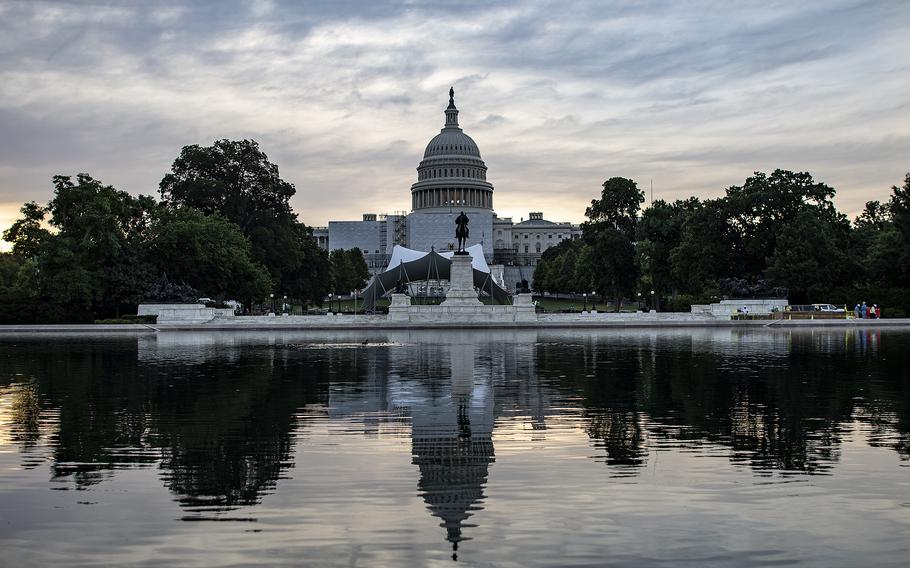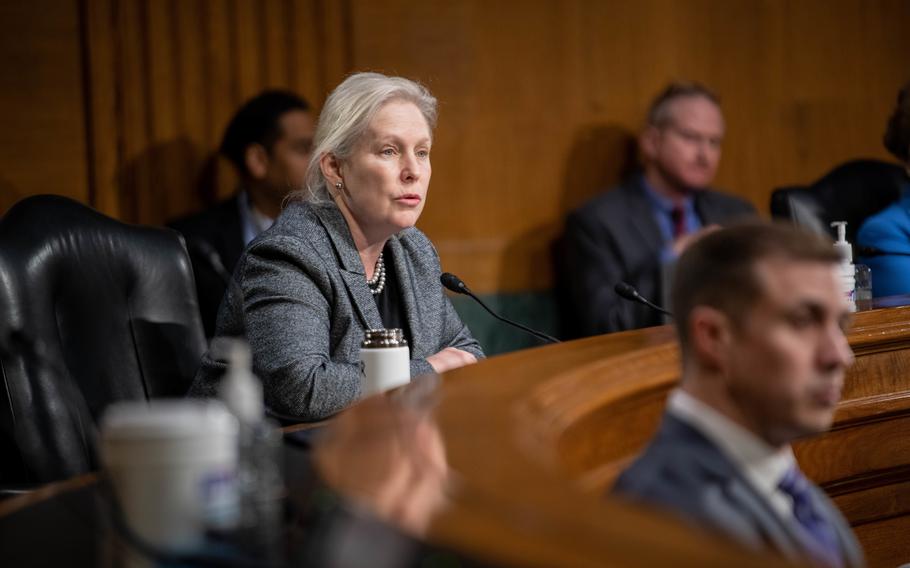
The U.S. Capitol is seen in Washington, D.C., on July 6, 2022. (Carlos Bongioanni/Stars and Stripes)
WASHINGTON — A proposed 5.2% pay raise for service members is the subject of new concern on Capitol Hill as lawmakers begin drafting an annual defense policy bill within the confines of a debt ceiling deal that limits government spending.
The agreement brokered by House Republicans and the White House last week locks in President Joe Biden’s $886 billion request for 2024 defense spending and prevents lawmakers from boosting the overall amount as they typically do. Congress last year increased a Defense Department spending plan that included a 4.6% salary boost for troops by $45 billion.
The inability of lawmakers to similarly pad the Pentagon's coffers this year could force a rethinking of congressional defense priorities, particularly among some Republicans who have called the proposed budget insufficient for competing with China and deterring Russian aggression.
Sen. Kirsten Gillibrand, D-N.Y., on Wednesday urged the leaders of the Senate Armed Services Committee to spare troop pay from any negotiations over potential budget cuts. Service members are slated to receive a 5.2% pay raise next year under Biden’s proposed budget.
Gillibrand, a senior member of the committee, pointed out that 24% of service members have trouble putting food on the table and military families continue to face challenges with spousal unemployment and underemployment.

Sen. Kirsten Gillibrand, D-N.Y., asks questions during a Defense Department budget hearing in March 2022. (Jack Sanders/U.S. Air Force)
“We are facing a recruiting crisis, making retention of our service members’ expertise and experience more important than ever,” she wrote in a letter addressed to Chairman Jack Reed, D-R.I., and the committee’s top Republican, Roger Wicker of Mississippi. “We cannot afford to make budgetary trade-offs that negatively impact those in uniform.”
Travis Sharp, a fellow at the Washington-based Center for Strategic and Budgetary Assessments think tank and a Navy Reserve officer, said it is highly unlikely troop pay will factor into discussions over the National Defense Authorization Act, an annual policy bill that outlines Pentagon priorities, or the appropriations bill that funds it.
“I can’t imagine Congress saying no, we’re going to take back the pay increase in order to free up funds to buy weapons systems,” he said. “That will be a political nonstarter.”
The drafting of the 2025 Pentagon budget could result in more trade-offs because the debt ceiling deal will essentially keep funding flat, but Sharp said troop pay will remain a primary concern for lawmakers, especially amid a persistent military recruiting crisis.
“Any increase for service members will be the very highest priority both because it’s just bad politics to not include that and also because we already have trouble getting service members,” he said. “If you very publicly take away a pay increase, it’s going to make the recruiting challenge even worse.”
Any potential cuts will probably come out of the Pentagon’s accounts for operations and maintenance and research and development, Sharp said.
The armed services committees in the House and Senate will begin laying out their defense priorities next week after weeks of delays caused by the standoff over the debt ceiling. House Republicans secured a deal last week that averted a default on the nation’s debt in exchange for two years of spending cuts.
The Senate signed off on the agreement but many Republican members of the Senate Armed Service Committee voted against it in protest of the spending cap on defense. Before the vote, senators secured a pledge from the upper chamber’s leadership that emergency supplemental funds could still be used to address threats from China, Russia and Iran and effectively beef up defense spending.
Rep. Mike Rogers, R-Ala., the chairman of the House Armed Services Committee, said Tuesday that he wanted a supplemental bill this year specifically for countering China. Reed — Rogers' counterpart in the Senate — suggested folding additional Pentagon spending into a supplemental bill providing aid to Ukraine, which is expected by September.
But House Speaker Kevin McCarthy, R-Calif., put a damper on those plans this week by telling reporters that the Defense Department has “a lot of places for reform” and any further increases to defense would need to go through the formal appropriations process.
The debt ceiling deal that McCarthy reached with the White House caps defense spending at about a 3% increase compared to last year. Defense hawks said that amounts to a cut when accounting for inflation and have called for defense budgets to grow consistently by 3 to 5% above inflation.